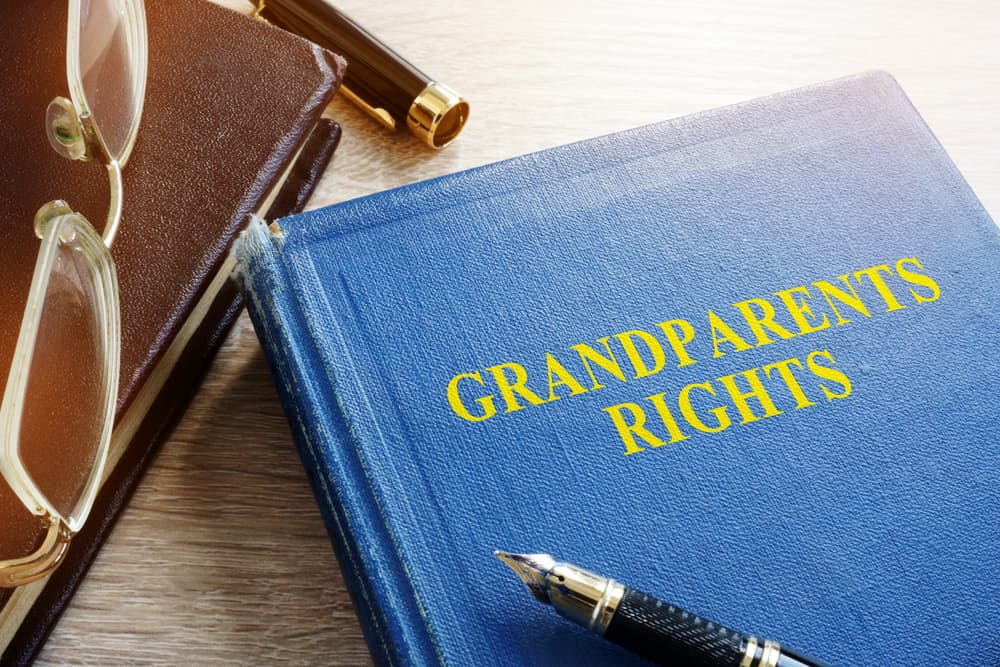Are you looking for grandparent rights during a divorce? You've come to the right place to find the answer.
The law presumes that divorcing parents have a right to raise their children as they see fit.
However, in many situations, depending on the circumstances, grandparents may have certain legal rights, including visitation or even guardianship. When the court makes a decision, the best interests of the children are the topmost concern.
A knowledgeable family law attorney in your area can explain your rights and options and seek the best possible result for your circumstances.
Types of Rights that Grandparents May Have in a Divorce Proceeding

During a divorce, grandparents' rights can become complicated and sensitive.
As family dynamics change, grandparents may be concerned about maintaining their relationships with their grandchildren.
The legal system recognizes the importance of these bonds, and while laws often vary by jurisdiction, several common principles guide grandparents' rights during a divorce.
First, grandparents’ rights are not inherent but often derived from their relationship with their grandchildren.
Many jurisdictions have specific statutes that address grandparents’ visitation rights.
Grandparent Visitation Rights
Grandparents do not have automatic rights, but many states allow them to petition for visitation.
To succeed, grandparents usually must show:
- A significant pre-existing relationship with the child
- That continued contact is in the child’s best interest
Proving a Meaningful Relationship With the Child
Courts may look for evidence such as:
- Regular involvement in the child’s life
- Emotional support or caregiving
- Financial assistance or shared responsibilities
If maintaining the relationship benefits the child’s emotional or psychological well-being, courts may look more favorably on visitation requests.
This means showing that they have been involved in the child’s life in a meaningful way, providing emotional support, care, or even financial assistance.
Courts look favorably on evidence that maintaining this relationship benefits the child’s well-being.
In some cases, if one parent is deemed unfit or is absent due to circumstances such as incarceration or death, grandparents may have a stronger claim to visitation or even custody.
When Grandparents May Have Stronger Legal Claims
Grandparents may have stronger claims if:
- A parent is absent, incarcerated, or deceased
- A parent is deemed unfit
Even in these cases, the court’s analysis remains focused on what best serves the child.
Factors Used to Determine the Best Interests of the Child as They Pertain to Grandparent Rights in a Divorce

Determining the best interests of the child is the central guiding principle in family law – especially during divorce proceedings involving grandparent rights.
The Existing Relationship Between Grandparent and Child
Courts consider:
- The length and depth of the relationship
- Frequency of contact
- Emotional bonds and support
A strong, positive relationship can significantly impact the court’s decision.
The Child’s Wishes (When Age-Appropriate)
If the child is mature enough to express a reasoned preference, the court may take those wishes into account.
Mental and Physical Health of All Parties
Courts assess:
- Whether grandparents are physically capable of caregiving
- Any mental health concerns that could affect the child
- The child’s health needs and how well they can be met
Stability of the Grandparents’ Home Environment
Judges may review:
- Financial stability
- Living conditions
- Overall emotional and psychological environment
The court will always seek the best for the children.
Relationship Between Parents and Grandparents
Courts consider whether:
- The adults can cooperate respectfully
- Ongoing conflict might negatively affect the child
High conflict can weigh against granting visitation or custody.
Parents’ Fitness and Circumstances
If parents struggle with:
- Substance abuse
- Neglect or abuse
- Serious mental illness
Grandparents may have a stronger case for custody or expanded visitation.
The Child’s Adjustment to Home, School, and Community
Courts aim to:
- Minimize disruption
- Maintain continuity in education and social life
If you want to learn more about how they make the decision, take a look at this article.
Can a Grandparent Obtain Guardianship Rights in a Divorce Case?
| Grandparent Guardianship & Visitation Process | What the Court Evaluates |
|---|---|
| Grandparent Visitation Rights | Determines whether grandparents may receive visitation rights based on the child’s best interests. |
| Filing a Guardianship Petition | Grandparents must formally petition the court and explain why guardianship or visitation rights are necessary. |
| Evidence of Parental Unfitness | Courts review evidence such as neglect, abuse, substance abuse, or mental illness involving the child’s parents. |
| Role of Legal Parents | Judges give significant weight to the wishes of legal parents unless exceptional circumstances exist. |
| Court Hearing & Best Interests Review | The court evaluates whether granting visitation or guardianship better serves the child than remaining solely with the parents. |
| Home Study or Social Worker Evaluation | Assesses the grandparents’ home environment, stability, and ability to care for the child. |
| Awarding Grandparents Visitation Rights | If approved, the court may award grandparents visitation rights or guardianship on a temporary or permanent basis. |
| Assistance From an Experienced Family Law Attorney | An experienced family law attorney can help grandparents protect their rights and navigate contested cases. |
Grandparents may seek guardianship during a divorce when parents are unable or unfit to care for their child.
Common reasons include parental neglect, abuse, substance abuse issues, or mental illness.
The process requires filing a court petition, presenting evidence, and demonstrating that guardianship serves the child’s best interests.
Courts may order evaluations and hearings before deciding whether to grant temporary or permanent guardianship.
Temporary vs. Permanent Guardianship
- Temporary guardianship: When parents may regain fitness
- Permanent guardianship: When parents are deemed permanently unfit
If parents agree to guardianship, the process is often simpler.
If your son or daughter's partner is seeking sole custody, we have a guide available for that case.
What Happens When a Dispute Arises Over Grandparent Rights?
Disputes can arise when grandparents seek visitation or custody against parental wishes.
Mediation as a First Step
Mediation involves a neutral third party who helps families reach an agreement outside of court. Benefits include:
- Lower cost
- Faster resolution
- Reduced conflict
- Preservation of family relationships
Court Trials and Judicial Decisions
If mediation fails, the case may proceed to trial. The judge considers:
- Evidence and testimony
- The child’s best interests
- Potential benefits or harm
Trial outcomes are legally binding but can be emotionally and financially costly.
Guardian ad Litem (GAL) Appointments
Courts may appoint a GAL to:
- Investigate independently
- Interview family members and professionals
- Make recommendations focused on the child’s welfare
Collaborative Law as an Alternative
Collaborative law allows parties to work with attorneys to negotiate a solution without litigation, often involving child specialists or other professionals.
Enforcement of Court Orders
If visitation or custody is granted:
- Orders outline schedules and conditions
- Violations can result in enforcement actions or modifications
How an Experienced South Carolina Family Law Attorney Can Help

When grandparents become involved in a divorce or custody situation, emotions often run high.
Questions about parental rights, visitation, and a child’s stability can be overwhelming.
An experienced South Carolina family law attorney, along with a team of probate attorneys, can guide you through the process with clarity and practical advice.
Understanding Your Rights and Options
Every family law case is different. A family law attorney will take the time to understand your situation and explain how South Carolina law applies to grandparents.
They can help you understand:
- How courts balance parental rights with grandparent visitation requests
- What family court judges typically look for in these cases
- What outcomes may realistically be possible
This early guidance helps many grandparents feel more confident and less uncertain about what comes next.
Handling the Paperwork for You
Legal paperwork can be confusing and stressful, but an attorney makes sure everything is handled correctly from the start.
They will:
- Prepare and file court documents accurately
- Make sure deadlines are met
- Ensure all filings comply with family court rules
Speaking for You in Family Court
If your case goes before a judge, having someone speak on your behalf can make a real difference because a family law attorney will:
- Represent you in family court hearings
- Present your concerns clearly and respectfully
- Respond to arguments raised by the child’s parents
- Keep the focus on what is best for the child
This support is especially important when divorce grandparents disputes become tense or contested.
Helping Resolve Issues Without Going to Trial
Not every case needs to end in a courtroom battle. In many situations, grandparents and parents can reach an agreement through mediation but an attorney can help by:
- Preparing you for mediation discussions
- Protecting your legal rights during negotiations
- Making sure any agreement about visitation, custody, or child support is fair and enforceable
Mediation often leads to quicker solutions and helps preserve family relationships.
Offering Support During a Difficult Time
These cases aren’t just legal, they’re personal. An attorney provides steady guidance when emotions run high.
They can help you:
- Stay focused on the child’s needs
- Avoid decisions made out of frustration or stress
- Understand what steps truly move your case forward
That calm, objective support can be just as valuable as legal knowledge.
Making Sure Court Orders Are Followed
If the court grants visitation, custody, or guardianship, those orders must be respected.
If problems arise, an attorney can:
- Help enforce visitation or custody orders
- Address issues related to child support or compliance
- Request court intervention if orders are ignored
If you're seeking how much is cost to hire a lawyer, check the following guide.
Speak With a Knowledgeable South Carolina Family Law Attorney Today

A skilled family law attorney can protect your rights, guide you through every stage of the process, and work toward the best possible outcome for you and your grandchildren.
If you are a grandparent concerned about your legal rights during a divorce in Myrtle Beach, Columbia, Aiken, or throughout South Carolina, our team is ready to fight for you.
Contact Morris Law Accident Injury Lawyers today at (843) 632-5229 or Schedule Your Free Case Evaluation Online to discuss your options with a knowledgeable professional.
FAQS
1. What are grandparent rights during a divorce?
Grandparent rights during a divorce refer to a grandparent’s ability to request visitation or, in limited situations, custody or guardianship of a grandchild.
While parents’ rights are strongly protected under South Carolina law, family courts may allow grandparents to seek visitation if it is in the child’s best interests.
2. Can grandparents get visitation rights if both parents object?
In many cases, it can be difficult. South Carolina family courts give significant weight to parental rights, particularly when both parents are fit and united in their decision.
However, grandparents may still have options if they can show exceptional circumstances, such as harm to the child or a long-standing, meaningful relationship that should be preserved.
3. Do grandparents have to go to family court to protect their rights?
Not always. Some cases can be resolved through mediation or negotiated agreements between parents and grandparents.
4. How can Morris Law Firm help grandparents in South Carolina?
Morris Law Firm assists grandparents in Myrtle Beach, Columbia, Aiken, and throughout South Carolina with visitation, custody, and guardianship matters.
The firm helps grandparents understand their legal options, prepares and files court documents, represents them in family court, and works to protect both their rights and the child’s best interests.








